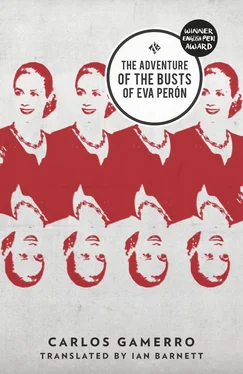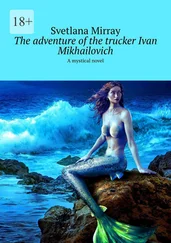‘Are you going to be long?’ Mabel asked him, and Marroné was tempted to scream ‘Can’t you see that, if you hurry me, I’ll feel pressurised and end up taking twice as long?’ when he remembered that he’d already undergone his daily ordeal and was only looking for somewhere quiet to get some reading done.
‘I’ll be as quick as I can,’ he replied as usual and, before Mabel could answer back, he had left the room and was descending the stairs and heading for the bookcase, where he began running his index finger over the spines and titles in search of a book to keep him company. Drucker’s The Practice of Management ? No, too constipated. Edward de Bono’s The Use of Lateral Thinking ? Already knew it by heart. Schumacher’s Small is Beautiful ? It had been a gift from a hippie professor at Stanford and he hadn’t been able to get past the opening pages. He needed something more reader-friendly, something from his favourite genre for example, a book that could draw ideas and principles of business philosophy from the great works of universal culture. He owned several, some very good, others so-so: Jesus Means Business , for example, was nothing but a rehash of Og Mandino’s classic The Greatest Salesman in the World ; but Konosuke Takamura’s Haikus for Managers was a real oyster bank from which he had extracted such pearls as:
A huge pyramid
An elephant can’t climb it
A tiny ant can
But his undisputed favourite was Shakespeare the Businessman by R Theobald Johnson. Thanks to this volume he had been able to maximise the benefits derived from reading the Swan of Avon in the classrooms of St Andrew’s, for Shakespeare the Businessman taught you to apply what you had learnt at school to the daily routine of the efficient executive, turning each play into a fountainhead of practical teachings: from Hamlet , for example, you could learn to avoid endless, fruitless procrastination in the decision-making process; from The Merchant of Venice , to pore over the small print of a contract, especially when dealing with venture capital; Henry V was a lesson in leadership, and Timon of Athens an appeal not to overspend on advertising and representation; King Lear alerted one to the dangers of dividing up a great family enterprise among the heirs, of rewarding the flatterer and punishing the critic and, above all, of putting off the appointment of a successor till the last moment and then naming them on a whim; Romeo and Juliet was about the sometimes tragic consequences of communication failures in companies, and Richard III about the destructive potential of the executive hell-bent on reaching the top by climbing a staircase of severed heads. Macbeth got it on the nose when it pointed to the wife who stays at home as the true power behind the unscrupulously ambitious husband, as did Antony and Cleopatra — but about the opposite risk: of losing in the voluptuous arms of a lover the Spartan virtues demanded by one’s profession. Othello offered the most penetrating analysis of in-house intrigues — that daily hell unleashed by jealousy, envy and rumour — and of the unimaginable destructive potential of a mid-ranking executive who feels he has been unfairly overlooked in his promotion. The Tempest , on the other hand, was an object lesson in how to regain control of a company with minimum damage to the organisation; and Mark Antony’s speech in Julius Caesar provided a master class in public speaking, combining the best classical oratory with the highly efficient use of the material props of a modern audiovisual presentation: the slashed cloak, the blood, the body of the assassinated leader. Bidding it farewell with a wistful caress of its well-worn spine, Marroné’s finger moved on until it ran into Michael Eggplant’s Don Quixote: The Executive-Errant , which his parents had recently brought him back from Spain. With a whoop of jubilation he grabbed it off the shelf and made straight for the bathroom, where, dropping his trousers out of mere habit, he sat down on the seat and began to read:
Hundreds of years ago western civilisation was about to perish under the onslaught of the armies of the night. There then emerged a special class of men, emissaries of light, pillars of society, defenders of justice and the true faith: the knights-errant. Thanks to them Christian Europe was able to defeat its enemies within and without, and prosper, sending out its light to all the peoples of the world. Today, as the darkness takes on new forms and once more lays siege to the citadel of civilisation, the future of the free world and the liberation of the iron-bound once again rests with a force of chosen men, the true heirs of the knights-errant of yore: the managerial classes — the executives-errant. Their castles are the dazzling crystal towers of corporations; instead of lances they bear fountain pens, and briefcases instead of shields; they travel not by horse but by plane, yet fundamentally nothing has changed. The emergence and development of the executive class is the crucial, defining event of our times, and one of the most significant in the history of mankind. More than presidents and statesmen, more than religious and military authorities, more indeed than the owners of businesses, it is executives who pave the way, who are in the front line on the battlefield as were the knights-errant of yore. Their appearance at the start of our century coincides with the most spectacular leap forward in the history of mankind: one that leads from a materialist civilisation, subject to the tyranny of existing resources, to an idealist one, in which the unlimited generation of resources ensures the true liberation of the human spirit. In this very spirit Cervantes’ celebrated hero, Don Quixote of La Mancha, decides one fine day to turn his back on the meagreness of his material life and the shallowness of the world around him — gutless mediocre folk devoted to traditional ways of doing things, for whom the word creativity is anathema — and strikes out on the highways in search of adventure. Don Quixote’s gesture encapsulates the adventurous spirit of today’s businessmen: conquering new markets, daring to vie with the corporate giants, earning themselves a name and an image, and devoting their lives to it. Until this moment — his fiftieth year — he has done nothing with his life: a village squire, a poor squire, so obscure and retiring that we cannot be certain of his real name: Quesada, Quijana, Quejana… Sr Quejana has not lived, but merely vegetated in the shadows of others’ adventures, like some small-time village tradesman who seeks consolation for the flatness of his life in the biographies of millionaires. Then, one fine day, he looks in the mirror and does not recognise himself. That dull, grey face, those lacklustre eyes, that look of defeat — the bitterest look of defeat, the look of someone who has never fought — cannot be his. Another expression is possible: that of his true self, that of his unexplored potential. And on that day he resolves to become Don Quixote of La Mancha.
Marroné closed the book for a moment. There’s no such thing as chance, he thought. This book had been sitting patiently on the shelves of his bookcase for the right moment to awaken. And that night, of all nights, on the eve of his new life — a life of adventure, a life in which his dreams would begin to come true — it had called out to him, to pass on its message of encouragement, and his hand had reached for it. This was what he had been waiting for, he saw it clearly now. Tomorrow, when dawn broke, Ernesto Marroné would go out into the world. Who knows who would come back?
Anxious and enthusiastic, he skipped the rest of the introduction and, opening the book at random, began to read a section entitled:
Читать дальше











